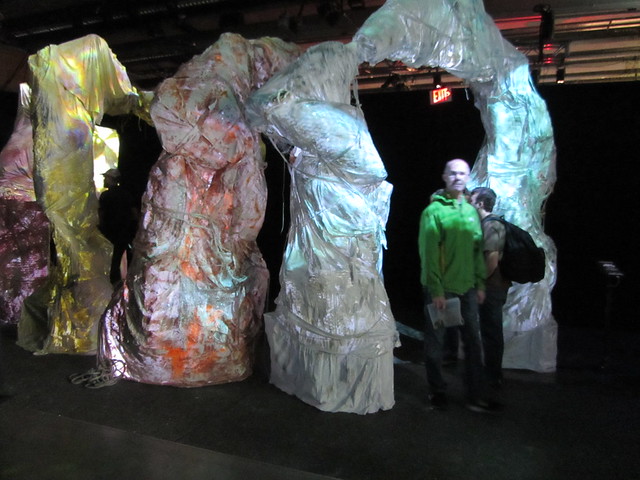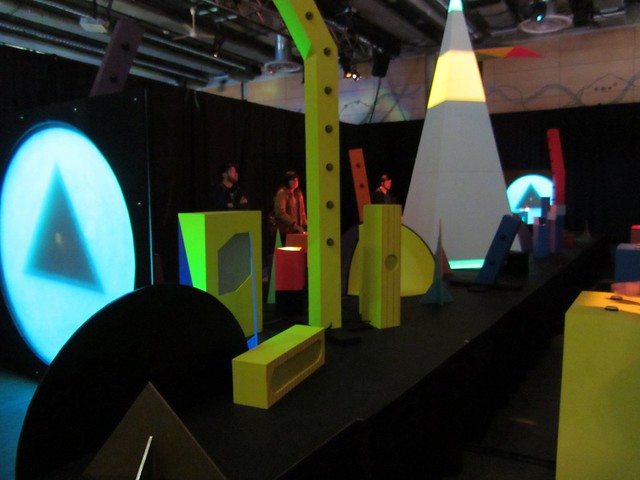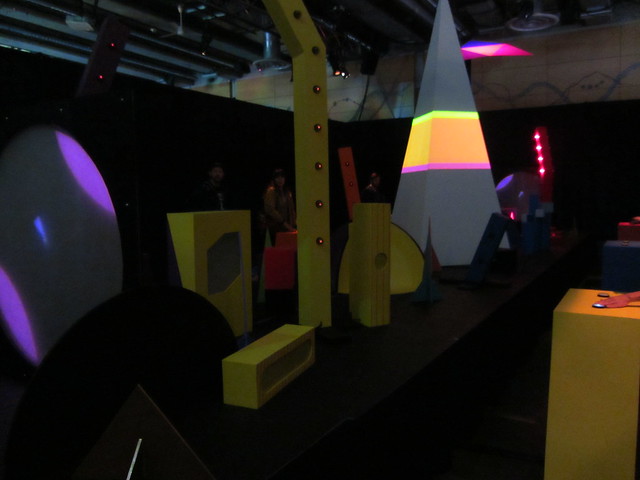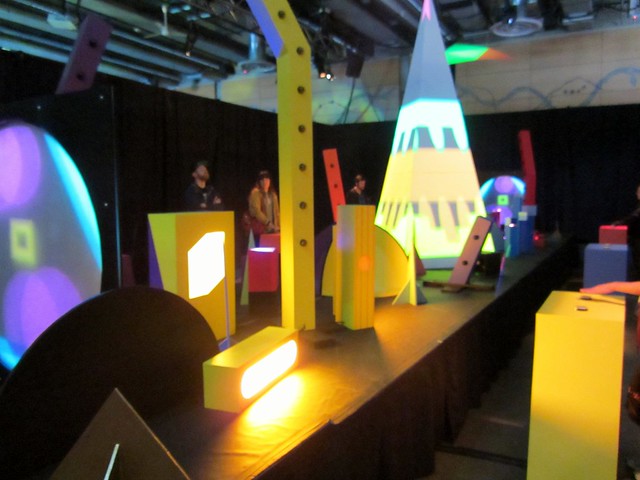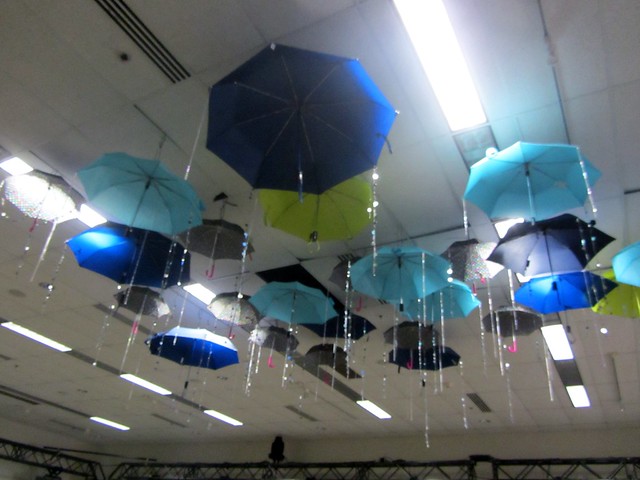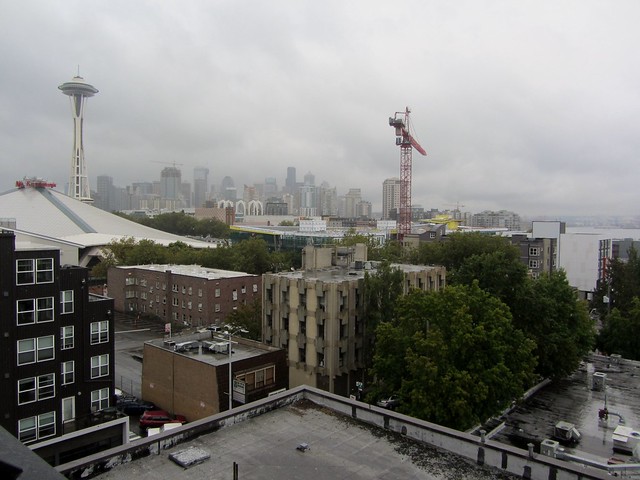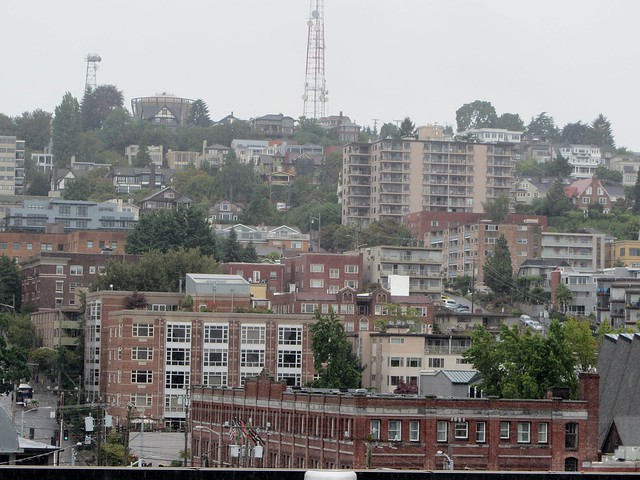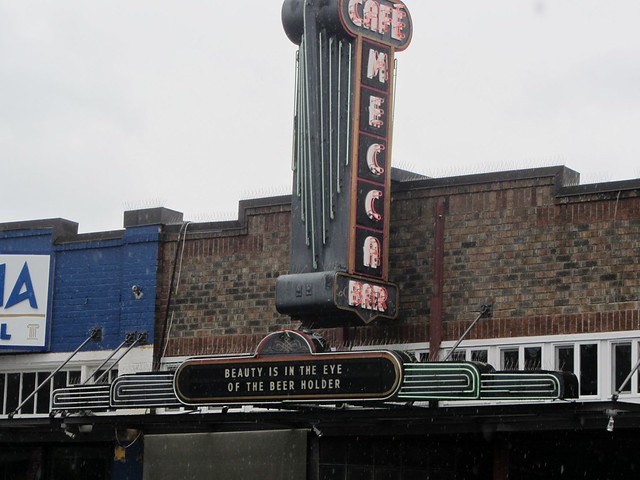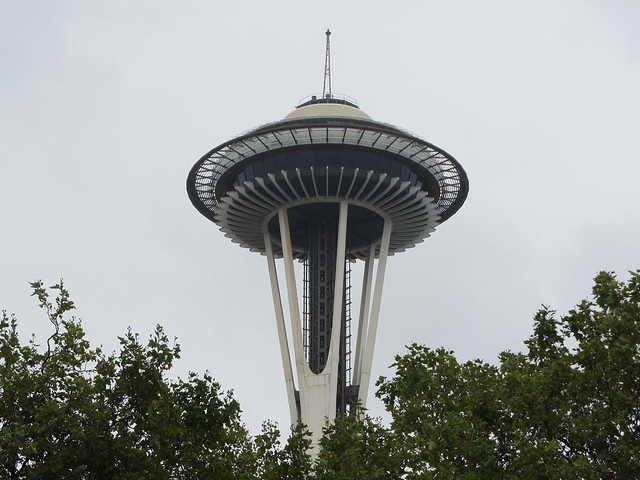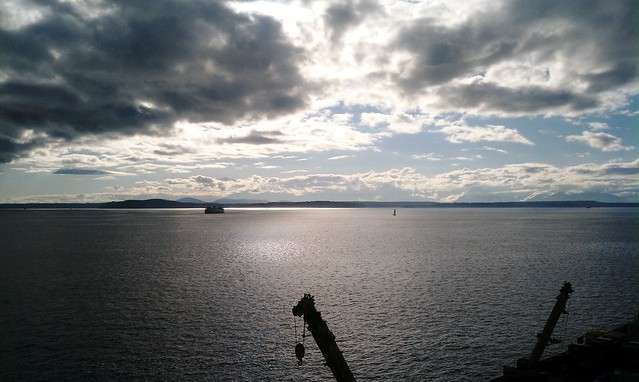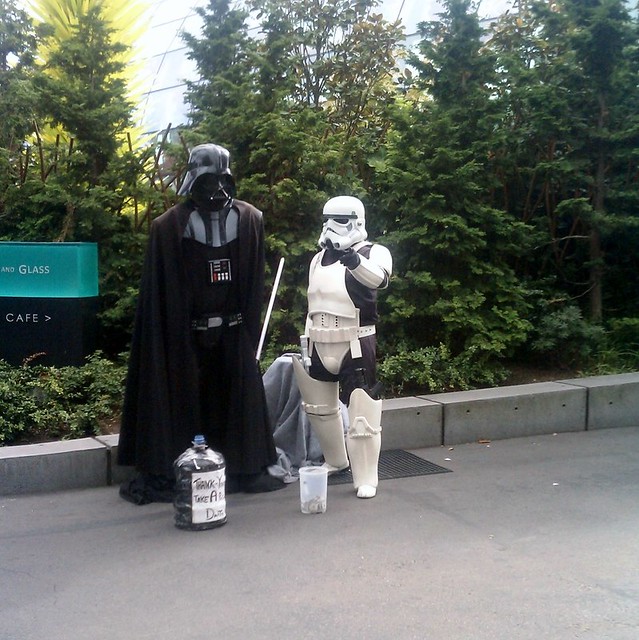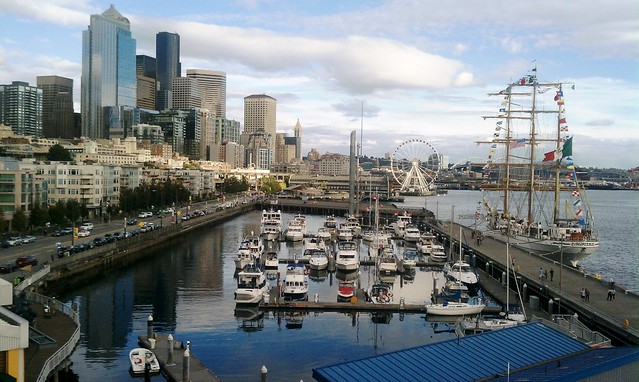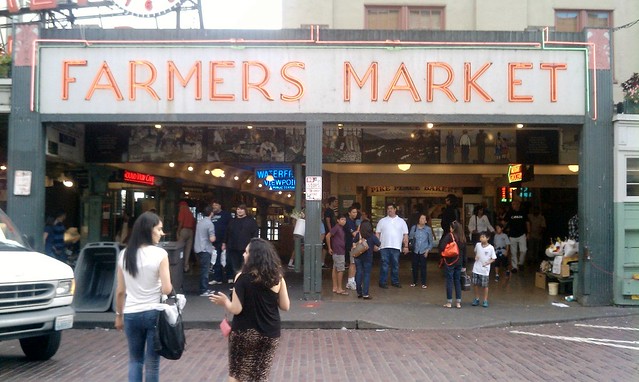"Why Can't I Be Different and Original . . . Like Everybody Else?" - Viv Stanshall
Sunday, August 31, 2014
Saturday, August 30, 2014
Friday, August 29, 2014
10 Days Off - Day One
Seattle. Delta flight in the afternoon got me to the Pacific Northwest in time to take in some sights along the waterfront, including Pike's Place Market.
Thursday, August 28, 2014
And Now For Something Completely Different
Wednesday, August 27, 2014
 |
| Marbutt Supply Company, Adairsville, Georgia |
Full fathom five thy father lies; of his bones are coral made. Those are pearls that were his eyes. Nothing of him that doth fade but that suffers a sea change into something rich and strange, and I alone am left to tell the tale.
Call me Ishmael.
(William Shakespeare, from The Tempest)
Tuesday, August 26, 2014
Questions
 |
| Sheri Brown, Seattle, 2011 |
If faith is to be based on empirical evidence and not blind belief, should not The Four Noble Truths better be called The Four Theorems or The Four Propositions, or even The Four Practices (accepting the existence of suffering, abandoning the cause of suffering, realizing the cessation of suffering, and cultivating the eightfold path)?
And while we're at it, should the various aspects of the eightfold path really be called "right" understanding, "right" thought, "right" speech, etc.? Doesn't "right" imply an acceptance of dogma, and isn't it more than just a little dualistic? If we're to whole-heartedly and completely practice the eightfold path, wouldn't "whole" or "complete" understanding, thought, speech and so on be a better label for the holistic engagement in the eightfold path?
Or, since the buddha-way existed before our knowing it or naming it, wouldn't it be best to not call it anything at all, but to just do it?
Monday, August 25, 2014
That Which Has Not Been Named
Chodo Cross tells us that all of us belong to something which, prior to our naming it or thinking about it, is already there. And it already belongs to us. Dharma is one name for what is already there.
One day, the Chinese Patriarch Hui-Neng said to the assembled monks, "I have something that has no head, no tail, and no name. There is no calligraphic character to write for it. It has no back and no front. Do you monks know what it is?" Jinne came forward and said, "I will tell you. It is the origin of all the buddhas. It is my buddha-nature." Hui-Neng said, "I told you it has no name or defining character, and yet you call it 'the origin of buddha-nature'. You may afterwards become the master of a little temple, but you will never be anything more than a lecturer on Zen."
If I told you I had the last thing you expected in the other room, whatever you guessed it to be, it wouldn't, because that wasn't the last thing you expected.
Sunday, August 24, 2014
Leap Into Faith
The leap of faith of Immanuel Kant, and later Søren Kierkegaard, is the act of believing in or accepting something intangible or unprovable, something without empirical evidence. It is an act commonly associated with religious belief, as many religions consider faith to be an essential element of piety.
The leap into faith described by Nagasema to King Milinda is based on empirical evidence. The frightened crowd of people see a man conscious of his own strength and courage, as fine a description of an awakened person as I can think of, leap over the raging torrent, and they then do not blindly believe, but know, that this can be done, and that they too can do the same.
The Buddha insisted that after his death, his followers not rely on his teachings as a matter of faith or dogma, but that they test for themselves to determine if these things are true. He considered his teachings as propositions or theorems that followers should solve for themselves, and act according to their own understanding and experience.
Saturday, August 23, 2014
Sapere Aude!
In his 1784 essay, Answering the Question: What is Enlightenment?, Immanuel Kant wrote "Enlightenment is man's emergence from his self-incurred immaturity." He argues that such self-inflicted immaturity is not from a lack of understanding, but from the lack of courage to use one's reason, intellect, and wisdom without the guidance of another. Kant claims that the motto of enlightenment should be Sapere aude! ("Dare to be wise!").
Kant considered dogmas and formulaic thinking to be the fetters of an everlasting immaturity, or nonage. Perhaps considering Nagasena's answer to King Milinda's question regarding faith, Kant notes that the man who casts off these fetters makes an uncertain leap over the narrowest ditch because he is not used to such free movement.
"That is why there are only a few men who walk firmly, and who have emerged from nonage by cultivating their own minds. It is more nearly possible, however, for the public to enlighten itself; indeed, if it is only given freedom, enlightenment is almost inevitable. There will always be a few independent thinkers, even among the self-appointed guardians of the multitude. Once such men have thrown off the yoke of nonage, they will spread about them the spirit of a reasonable appreciation of man's value and of his duty to think for himself."
Friday, August 22, 2014
Leap of Faith
King Milinda was a Indo-Greek ruler who established a large empire in South Asia. Born in the Caucasus, he was initially a king of Bactria. He eventually established an empire in the Indian subcontinent stretching from the Kabul River valley in what is now Afghanistan eastward to the Ravi River.
King Milinda was a patron of Buddhism, and his conversations with the Buddhist sage Nagasena are recorded in the text The Questions of King Milinda. One question concerned the nature of faith, and Nagasena answered with a parable:
"Suppose that a great cloud were to burst over a hill slope. The water then would flow down the slope, would first fill all the hill's clefts, fissures, and gullies, and would then run into the river below, making its bank overflow on both sides. Now suppose further that a great crowd of people had come along, and unable to size up either the width or the depth of the river, should stand frightened and hesitating on the bank. But then some man would come along, who, conscious of his own strength and power, would take a step back and then leap across the river. And the great crowd of people, seeing him on the other side, would cross likewise."The backward step, the retreat and refuge before the great leap forward.
Thursday, August 21, 2014
The Backwards Step
In Buddhism, they talk of "retreats" and "taking refuge."
This used to confuse me. It sounded like running away from the world. If the whole point of practice was to experience the here and now as it actually is, wasn't all of this retreating and taking refuge just avoiding the very thing with which we were supposed to be engaging?
I understand the words differently now. Now I see both terms as referring to taking a backwards step, just as one might do when one wants to see something more clearly or with a little more perspective, just as one might do before taking a running, head-first leap into that from which one just stepped back.
Corollary lesson: if you're sparring with a martial arts opponent, don't necessarily think she's running away from you if she takes a backwards step.
Wednesday, August 20, 2014
Time
 |
| Slickrock Creek, North Carolina, September 2005 |
Remember, time is what we make of it. We are not like little boats floating along in the river of time, a river beyond our control that sweeps us away, but instead time issues from our very minds. Time proceeds slowly when we feel it going slow, and it's fast when we feel it going by quickly.
Time is in us, we are not in time.
Tuesday, August 19, 2014
Time
 |
| Pascagoula, Mississippi, 2005, one month before being devastated by Hurricane Katrina |
To every thing there is a season, and a time to every purpose under the heaven: a time to be born and a time to die; a time to plant and a time to pluck up that which is planted; a time to kill and a time to heal; a time to break down and a time to build up; a time to weep and a time to laugh; a time to mourn and a time to dance; a time to cast away stones and a time to gather stones together; a time to embrace and a time to refrain from embracing; a time to get and a time to lose; a time to keep and a time to cast away; a time to rend and a time to sew; a time to keep silence and a time to speak; a time to love and a time to hate; a time of war and a time of peace. (Ecclesiastes 3, 1-8).
All these times come to us - our problem is we want to pick and choose which times come when, and we want all the good times and none of the bad.
This apparently is the time for me to work long days and through the course of weekends. This time is all business - fun and games will resume when it is their time again.
Monday, August 18, 2014
Japanese Death Poem
Sunday, August 17, 2014
Cars
 |
| Interstate I-16, August 2005 |
Cars isolate people. They keep us seated and sedentary, apart from our neighbors, isolated and alone. The highways they need carve up and divide our cities, keep neighborhoods separated, and are formidable barriers to pedestrians. The traffic they cause generates stress, anxiety, road rage, and loathing. Their petroleum fuel contributes to climate change, ozone pollution, smog, and haze, and provides funds for Islamic extremists. Cars promote urban sprawl and the loss of wildlife habitat and the tree canopy, and their in-town parking lots occupy valuable urban space and keep buildings far apart and separated, further discouraging pedestrian access. They sometimes kill us slowly through stress and pollution and by keeping us from exercising, and sometimes rapidly in violent accidents that shock our sensibilities.
Atlanta's Interstate highways are not roads, they are failures of urban planning and design. They are the boulevards of broken dreams. They are what's wrong and they are the problem.
Saturday, August 16, 2014
Tanka Time
Zen Master Tanka once said that Tokusan had not "awakened to entering the grasses and searching for people with his whole body soaked in muddy water," and that he was endowed with only one single eye (meaning he could only see things from one perspective).
Tanka entered the hall and said, "Tokusan spoke as follows, 'My doctrine is without words and phrases, and truthfully, I have no dharma to impart to people.' You can say that Tokusan knew how to 'go into the grass' to save people, but he didn't 'soak the whole body in muddy water.' If you look carefully, you see that he has just one eye. But as for me, my doctrine has words and phrases, and a golden knife can't cut it open. It is deep, mysterious, and sublime. A jade woman conceives in the night."The truth might be beyond the words and symbols we use to describe it, but words and symbols are all that we have. We shouldn't give up or quit due to the difficulties in front of us.
Tanka once asked a monk if he had eaten yet, and when the monk said that he had, he asked "Did the one who brought you food to eat have eyes or not?"
Has anyone looked into Tanka?
Thursday, August 14, 2014
Corollary Caption
Zen Master Tanka asked a monk, "Did the one who brought you food to eat have eyes or not?"
The monk was dumbfounded.
Wednesday, August 13, 2014
Hitch
Tuesday, August 12, 2014
A Long Neck
We are not our bodies.
We are not fat. We are not skinny. We are not bald, nor are we hairy. We are not tall or short, attractive or ugly, strong or weak, young or old. We are not even men or women.
But as long as we keep identifying ourselves with the bodies in which the consciousness that we are aware of happens to reside, we will continue to suffer and be limited by the labels applied to those bodies, and we will be vulnerable to the scams and contrivances of advertisers, to peer pressure, and to crises of self esteem, and we will fear for our eventual death.
Corollary lesson: A great play does not fret over the conclusion of its last Act.
Monday, August 11, 2014
Lost
 |
| Charcoal briquette kilns in Paris, Arkansas |
If you define "lost" as having no idea where you are and despairing over ever finding your way back again, then I don't think I've ever felt lost.
There have been times when it turned out that I wasn't where I thought I was, or when I wasn't really sure exactly how to get back en route to where I was going, but I've always considered those times as challenges or puzzles, not as the existential remorse of being "lost."
Corollary lesson: You're never lost if you don't have any destination in mind.
Friday, August 08, 2014
What A Day
Cray cray day today. I won't bore you - or myself - with all the details, other than to say the day provided an appropriately frantic bookend to a 60-hour work week.
Program note: starting back on August 5 and continuing on into the indefinite future (meaning until I get tired of it), this blog will be featuring only original photography and other imagery.
Thursday, August 07, 2014
The brain is the organ that perceives thoughts, sort of like a radar station or an antenna. However, we somehow have this perception that our thoughts are in our head, but it's not the mind that's in our head, it's the brain that's in our head. The brain in our head is the antenna or radar that perceives mind and thoughts, but mind and thoughts are outside of our heads, they are not ours, they are not "us."
Wednesday, August 06, 2014
Tuesday, August 05, 2014
Monday, August 04, 2014
Life Is Hard
The other day, as I was driving to work, fighting the traffic on a muggy summer morning and stressed about all of the conflicting deadlines and limited resources in front of me, I was thinking, "Life is hard."
A few minutes later, as I was waiting for a light to change, I saw an elderly man on the sidewalk in a wheelchair. He was trying to navigate his way up a hill, and he had his wheelchair turned around backwards so he could push his way up with his legs. But he only had one leg, so he had to keep gripping the wheels of his chair to keep from rolling back down as he reset his one leg for the next push up the hill.
Suddenly, sitting in my Lexus on my way to my air-conditioned office for my salaried job, life didn't seem so hard after all.
Sunday, August 03, 2014
Subscribe to:
Comments (Atom)
-
For various reasons, I've long wanted to hate Starbucks Coffee, more specifically the retail chain and not their coffee itself, but have...
-
A couple weeks ago, I had some plumbers over to my house to fix a leak apparently coming from beneath my refrigerator. It turned out that, ...

